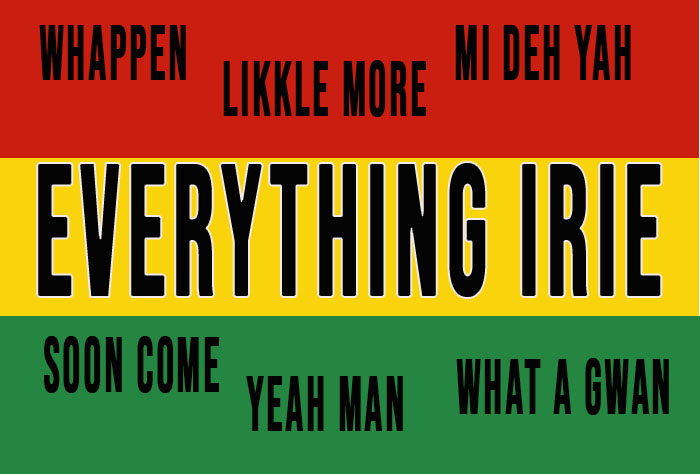English is the language of Jamaica but like most countries it has a dialect or creole which Jamaicans nowadays refer to as ‘patwa’. English is the language of business, academic and formal discourse, while patwa is the everyday language of the people. Hotel workers for example, are expected to speak to guests in standard English – quite often to their discomfort even as they switch effortlessly into their more comfortable form of speech with co-workers and even senior management. While all Jamaicans can talk patwa, not all can speak English or ‘code switch’.
Jamaican patwa is basically English in grammar and vocabulary, together with features derived from a variety of African dialects as well as from other European languages. The strongest influence other than English speech comes from Africa especially from the area of the Gold Coast (Ghana) and Nigeria from which the greatest number of African enslaved were captured and forcibly shipped to Jamaica.
African loan words come from most spheres of life but are particularly numerous for people and their conditions, music and dancing, plants food and animal life, superstitions, greetings and exclamations. So…….
Mumu is an idiot; pyka-pyka is untidy or messed up. The abeng is a cow horn originally used by the Maroons for signaling and mento is a form of music. Plant names include ackee, yam, and gungo peas. Matters of belief and superstition have brought duppy and obeah for witchcraft while exclamations commonly heard are aie for aay; eem; eh-eh and cho, the latter expressing scorn, impatience and exasperation.
Jamaican patwa is also a telling vehicle for conveying humor or warning, ridicule and scorn, flattery and tenderness. A short person is a duggy and a tall one longulala; fenky-fenky is a fuss-pot and bufu-bufu a clumsy person. Tallawah is strong and pya-pya weak and feeble. Doormout is doorway and eye-water, tears. Susu is gossip, kass kass a quarrel and mout -a –massy a chatterbox. Stuckeydee is a sweetheart and so is bunnununus.
Common Jamaican expressions to describe parts of the body are footbottom for the soles of your feet, handmiddle for palms and neckback for the nape of the neck and also a popular exclamation.
Listen to the Unique Description of the Jamaican Anatomy
Audio Source: Anonymous
In Jamaican patwa, inflections are banished and gender is ignored. The genders ‘he’ and ‘she’ are reduced to the all-purpose ‘him’ and can mean his or her. The African word unu is used for ‘you’ in the plural sense particularly to express contempt for the person referred to. The letter ‘V’ is often changed to ‘B’ as in bebridge for beverage while the letter ‘S’ often disappears at the beginning of words – so smash is ‘mash’, stop is ‘top’ – or ‘tap’ where the letter ‘A’ is often substituted for the letter ‘O’.
The Jamaican speech trait that is probably most noticeable to a non-Jamaican is the habit of dropping the letter ‘H’ or alternatively adding it where it is not required. Traditionally, the practice of adding the ‘H’ was seen as common either among the uneducated, trying to sound educated or as a form of over-affected speech. However, adding and dropping ‘H’s’ has become so pervasive that even so-called educated Jamaicans are often heard dropping and adding the ‘H’. Who can remember this little ditty?
STUDENT: teacher, arry tek di ammer an it me in mi ead
TEACHER: hemphasize you H’s you hignorant hass
Jamaicans have a peculiar talent for creating words and expressions to describe social realities or contemporary living styles. These appear and disappear regularly to be replaced by new expressions, although some do stand the test of time. Many of these words or expressions originate in the urban ghetto of Kingston, find their way into dance hall lyrics, become popularized as urban slang and sometimes transformed into national usage. A recent social media post on the origin of the expression ‘scandal bag’ (which every Jamaican knows is a black plastic bag used to package groceries and small items in the most sophisticated uptown supermarkets as well as the lowliest rural corner shop), elicited a flood of comments on the ‘scandal bag’ some of which were extremely hilarious. Some attributed the name to the fact that in the early days of its introduction the bag was clearer in colour so everything purchased could be seen. Another said because the bags were ‘noisy’ when used, that is what gave it the scandal connotation. From Western Jamaica came the comment that in that part of the island the name given is a ‘Lada bag’ in reference to the Russian-built Lada motorcar that was imported in large numbers in the 1970s and whose parts were said to be made out of plastic!
Do you have a ‘scandal bag’ story? What are some of the more Jamaican names and expressions you can think of? Here are some examples:
Chicken back scrap metal or gas pump (when its oily)
Imported used car deportee
Tin Mackerel flash out (has to be flashed out of the tin to get it out)
Turkey Neck poor man’s oxtail
Cheap Dress matey dress
Cheap gum substitute matey toothpaste
J$5,000 bill bolt (it disappears as soon as you break It).
See Article: Jamaican Geography
Resources: https://jis.gov.jm/


